Date palm is the most important fruit in the Saudi Arabian culture, being a staple food with historical and religious significance. The Kingdom of Saudi Arabia (KSA) is currently the second largest producer of date palm in the world with 23 million trees across 172,000 ha, producing 1.3 million tonnes. Most of the production is for domestic consumption as the country is the largest consumer of dates worldwide.
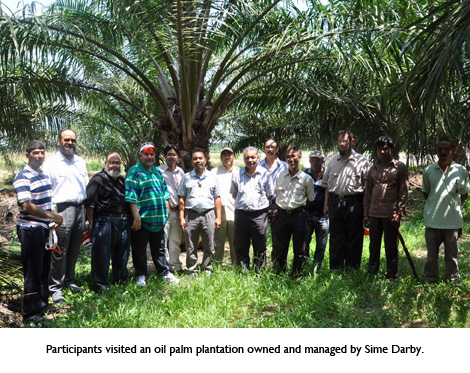 International Tropical Fruits Network (TFNet) jointly collaborated with the Food and Agriculture Organization of the UN (FAO) office in the Kingdom of Saudi Arabia to organize a study tour on Oil Palm Development Programmes in Malaysia on 14-25 May 2014.
International Tropical Fruits Network (TFNet) jointly collaborated with the Food and Agriculture Organization of the UN (FAO) office in the Kingdom of Saudi Arabia to organize a study tour on Oil Palm Development Programmes in Malaysia on 14-25 May 2014.
The participants of the tour were 7 officials from Date Palm Research Centre (DPRC), Al-Hassa, Saudi Arabia. The team was headed by FAO Representative Abdallah Ben Abdallah and DPRC Assistant Director of Head Research Affairs Al Jabr Ali Mohammed.
The objectives of this study visit were to:
- Learn about oil palm plantation management and processing;
- Exchange information on the pest management technologies for red weevil (Rhynchophorus ferrugineus);
- Identify processing technologies that can be used for dates;
- Explore possible uses for by-products of date palm, such as biomass and seed oil, based on Malaysia’s experience with oil palm;
- Determine oil palm mechanization technologies that can be applied to date palm;
- Identify possible markets for Saudi Arabian dates; and
- Discuss with relevant parties on potential joint collaborations among relevant stakeholders of the Saudi Arabian date industry and Malaysian oil palm industry.
The Malaysian Palm Oil Board (MPOB) briefed the participants on the oil palm programmes in Malaysia, including a tour of the exhibition areas. The participants also visited one of the plantations and processing mills owned by Sime Darby, the largest oil palm company in the world.
The participants took the opportunity to attend the 5th Malaysia International Palm Oil Technology Expo (PALMEX) 2014 in Sandakan, Sabah, Malaysia on May 21-22. The expo included a technical seminar on the “Technology of Palm Oil Biomass” and a conference on “Business Opportunities in Biomass Downstream”.
A discussion was held in Putrajaya on 23 May 2014 with the Saudi Arabia visitors, TFNet, and Malaysian representatives from the Department of Agriculture and MPOB. The meeting aimed to synthesize and reflect on the experiences during the visit, as well as discuss the following possible areas of collaboration:
- Biomass. The fruits are the only source of income from date farms. Malaysia has had a successful experience in utilizing the oil palm biomass, like palm fronds, stems empty fruit bunches, and kernel shells, into biogas and other products like plywood and fiber boards.
- Mechanization. Date palm production in Saudi Arabia still primarily operates using manual labor. While mechanized lifts are helpful during pruning, thinning, and harvesting, they are not specifically designed for date palm. Collaboration can be done using Malaysian oil palm machines that can be adapted to fit the conditions in Saudi Arabia.
- Oil. The date seed contains about 7% oil. Saudi Arabia can study Malaysia’s experience in oil extraction and conduct further research.
- Date processing. Dates are a seasonal fruit and can experience a large glut during harvest. More processing technologies can help the industry, especially the small farmers.
- Marketing. Malaysia consumes a large volume of dates during Ramadan. The collaboration can open a market for Saudi Arabian exporters.
During the meeting, it was agreed upon that the Saudi Arabian contingent will file a report regarding the 5 pillars of collaboration to their government. The visitors hope this can pave a way to establish a Memorandum of Understanding between the two countries.
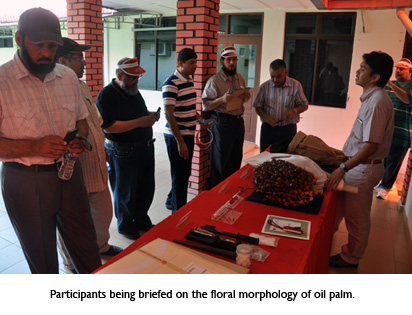
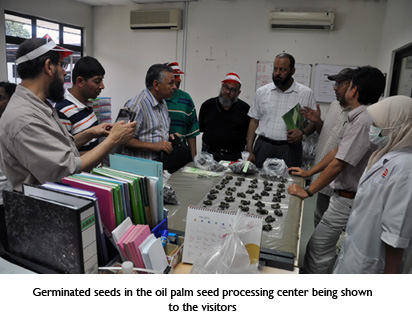

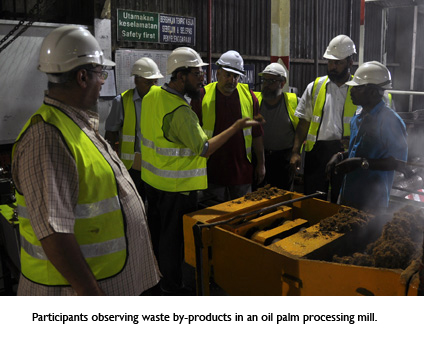

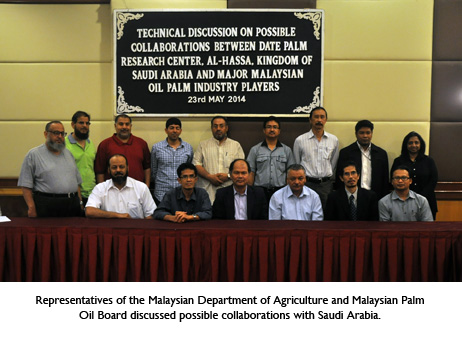
Is there a Vacancy for the post of GM in the KSA date palm Company ??